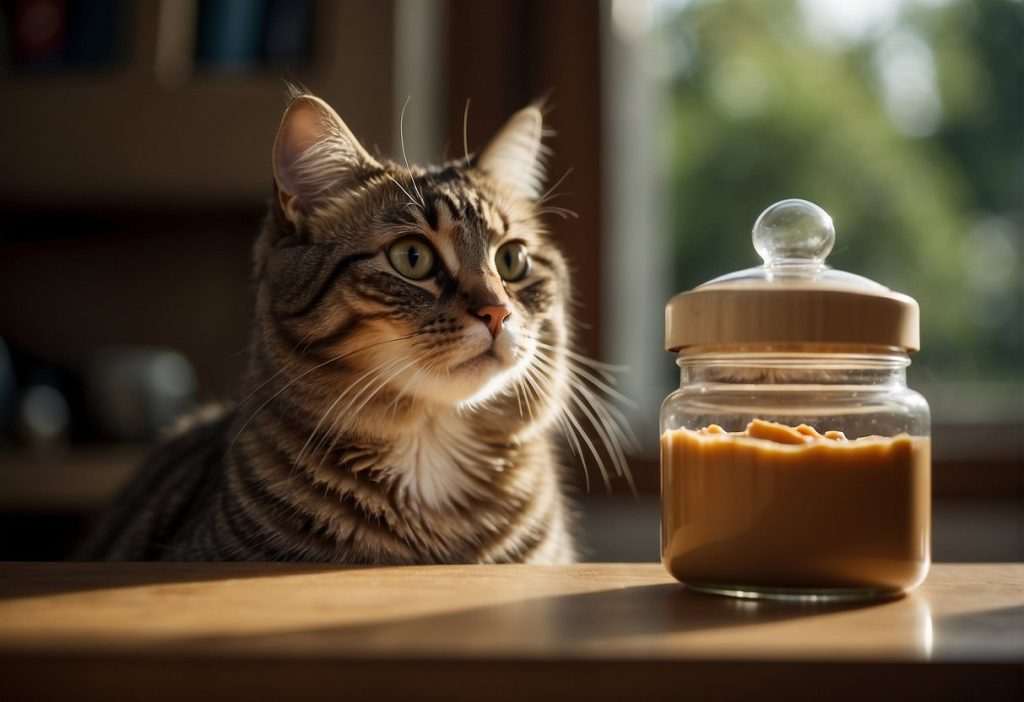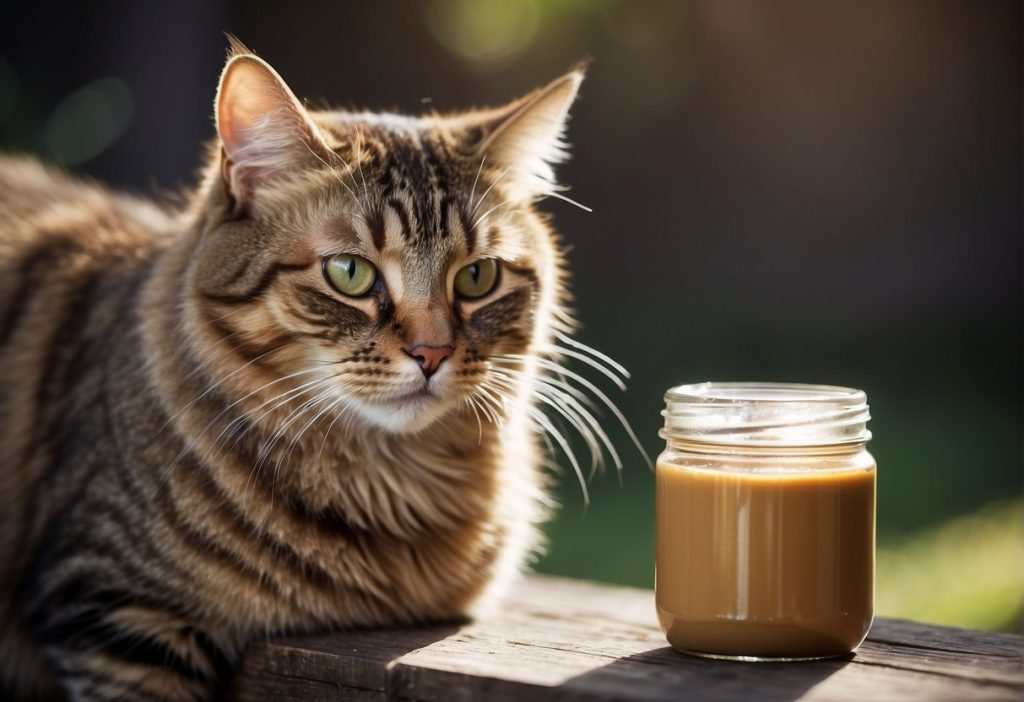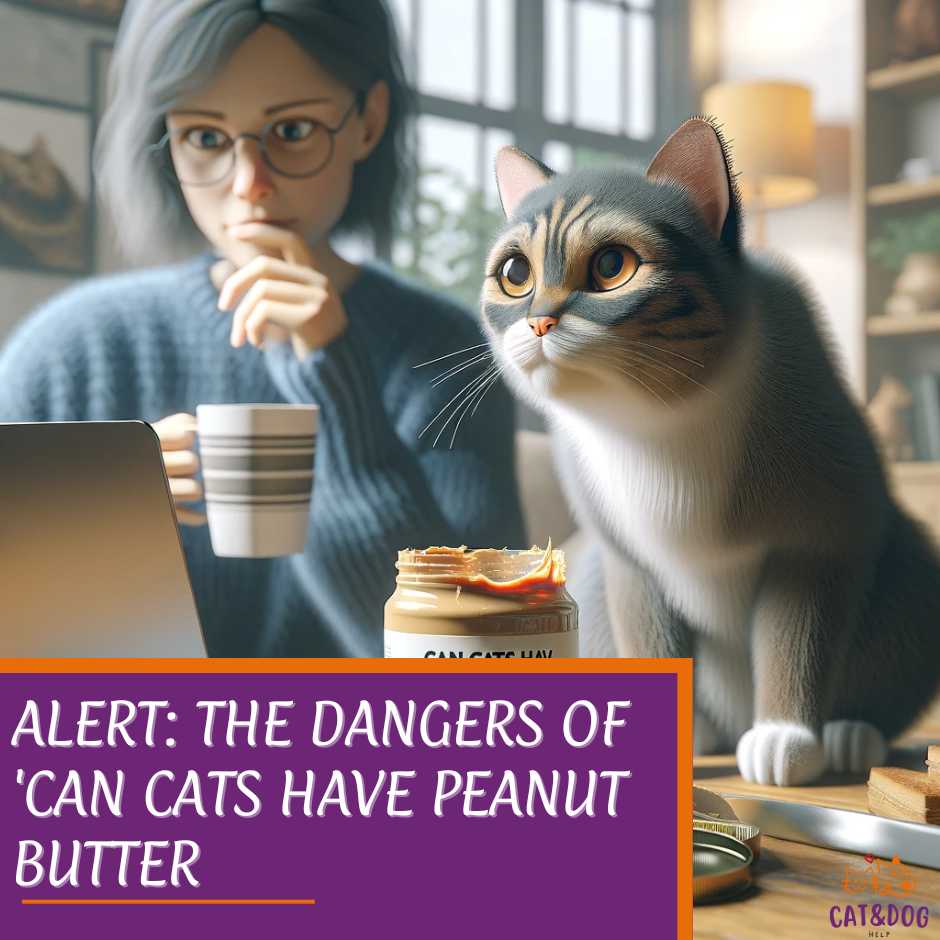When you peek into your pantry and spot a jar of peanut butter, you might wonder “Can cats have peanut butter?”
After all, who can resist those pleading eyes?
While most of us know that cats have different dietary needs than humans, the question of whether peanut butter is a safe treat for cats remains common.
Cats’ nutritional needs are quite specific — they are obligate carnivores, requiring a diet high in protein from animal sources.
This fundamental difference in nutrition, where peanut butter provides no nutritional value for cats, can affect how they interact with seemingly benign human foods.
Your cat will get the most key nutrients from their cat food.

Peanut butter, in particular, presents more cons than pros for cats. Although not inherently toxic, it’s a food that doesn’t align well with a cat’s dietary requirements.
Peanut butter doesn’t provide any nutritional benefits for cats and contains toxic additives that could be harmful.
Some peanut butter includes sweeteners like xylitol, which is dangerous for cats, and even without toxic ingredients, the high-fat content and potential for causing an allergic reaction or gastrointestinal upset. (1)
And while it’s tempting to offer a variety of treats, especially when they appear to be enjoyed, it’s essential to keep your cat’s long-term health in mind.
When in doubt, it’s best to stick to treats made specifically for felines, avoiding any potential risks that human food can pose.
Key Takeaways
- Cats require protein-rich diets, and peanut butter does not meet these nutritional needs.
- Peanut butter can contain harmful ingredients and cause health issues for cats.
- Stick to feline-friendly treats to keep your cat healthy and safe.
Can Cats Have Peanut Butter?
Ever wondered if that creamy or crunchy peanut butter you love can be a treat for your furry friend, too? Well, let’s get the scoop on whether peanut butter is a cat-safe snack.
Nutritional Content:
Peanut butter isn’t inherently toxic to cats, but it’s not exactly healthy food for your whiskered pal either.
Cats require a diet high in protein, and while peanut butter does contain protein, it’s not the complete kind your cat needs. (2)
Additionally, peanut butter is high in fats and carbohydrates—nutrients cats have little use for.
Consuming large amounts of peanut butter can lead to health problems such as frequent urination, thirst, vomiting, or seizures.
- Protein: Some, but not complete for cats
- Fats: High
- Carbohydrates: High
Risks to Consider: The risks of peanut butter might make you think twice before sharing. Xylitol, a common sweetener in some peanut butter brands, is highly toxic to cats. (3)
Even without xylitol, peanut butter can cause:
- Digestive issues: The high-fat content can lead to an upset stomach.
- Choking hazard: Peanut butter’s sticky nature can be difficult for cats to swallow.
- Allergic reactions: Just like humans, cats can be allergic to peanuts. (4)
If you’re tempted to treat your cat, opt for a meat-based snack instead. Your cat’s carnivorous nature will thank you for it!
Remember, not all human foods are cat-friendly, and what’s a treat for you can be trouble for them.
So, keep your peanut butter to yourself and treat your cat with something they can digest safely and truly enjoy—like a nice piece of cooked chicken or a cat treat designed just for them.
And hey, more peanut butter for you, right?
Harmful Ingredients in Peanut Butter
Hey there, cat lover! Ever wondered if that sticky, savory peanut butter could be a treat for your furball? It’s not so simple. Let’s talk about what’s in peanut butter that could cause more harm than purrs.
Xylitol: First up, xylitol. This sweet substitute is a big no-no. It’s often found lurking in ‘sugar-free’ or ‘low-sugar’ peanut butter. (5)
Just a tiny amount of sugar alcohol can lead to xylitol poisoning, liver failure, or worse, xylitol poisoning, for your kitty. It’s toxic to cats and dogs alike, so better keep it out of paw’s reach, okay?
| Ingredient | Side Effect |
| Xylitol | Liver failure, toxicity |
Fat & Sodium: Cats aren’t gym enthusiasts who carb-load. High levels of fats could upset their tummy or lead to pancreatitis. (6)
Now, sodium – cats need some, but too much and it’s like us after a salty fries binge: bad news for blood pressure.
- Fats: Can lead to pancreatitis and obesity.
- Sodium: High blood pressure, dehydration.
Remember, your cat’s nutritional needs differ from yours. Those tasty additives for us humans, like preservatives and sweeteners, could pose a risk too. They’re simply not cat-friendly.
In short, keep the PB jar for yourself and find kitty-safe treats. Your furry friend will thank you with cuddles, not vet bills! Stay informed and keep those nine lives safe and sound.
Alternative Healthy Treats for Cats
Hey there, cat lovers! Wondering what treats you can offer your kitty that is both safe and savory?
Let’s ditch the peanut butter and look into some lip-smacking alternatives that will have your feline friend purring for more.
Cooked Meats: Cats are obligate carnivores, meaning they love and need meat.
Stick to the basics like cooked chicken, turkey, or beef, but make sure they’re lean, free from any sauces or seasonings, and well-cooked to avoid any foodborne illnesses.
- Fish: Tuna or salmon can be occasional treats. Again, ensure they’re cooked and sans the garlic, onions, or heavy spices. (7)
Commercial Cat Treats: There’s a plethora of commercial treats designed specifically for cats. Opt for those low in calories and without any artificial coloring or preservatives.
- Look for treats with added benefits like dental health support or hairball control.
Cheese and Yogurt: Can cats tolerate cheese or yogurt? Some cats can tolerate dairy and might enjoy a small bit of cheese or a lick of plain yogurt. Just remember, not all cats handle lactose well, so observe for any signs of stomach upset. (8)
- Fresh veggies: Surprisingly, some cats enjoy veggies! Think steamed broccoli, asparagus, or chopped greens. These should be offered in moderation and always cooked to aid in digestion.
Remember: Moderation is key! Treats should make up no more than 10% of your cat’s daily caloric intake to maintain a balanced diet.
And always make sure fresh water is available to wash down those tasty morsels. Happy treating!
Enhancing Cat Dietary Knowledge
Have you ever wondered, “What’s the deal with cats and peanut butter?” Well, you’re not alone in this curiosity! When it comes to your feline friend’s diet, it’s vital to know what’s a treat and what’s a no-go.
Peanut Butter: A Yay or Nay? Peanut butter, while not toxic, is not the best snack for your kitty. It’s like candy for cats—tasty but not necessary. Here’s the scoop:
- Ingredients Matter: Stick to 100% peanut butter, free of additives.
- Xylitol Alert: This sweetener is a big no-no. It’s harmful and can be fatal.
- Fat Facts: Cats can’t handle too much fat, which might lead to obesity or pancreatitis.
Wondering about your specific furball? Tailored dietary choices are essential, especially when considering breed and health conditions.
For example, what’s perfect for a Sphynx may not suit a Persian’s nutritional needs. And for cats with a sensitive stomach? Peanut butter might just stir up trouble.
Interactive Fun: Got a minute? Try out an online quiz or use a calculator to check if your cat’s diet is on point. You’ll get a clearer picture of what your fuzzy overlord should (and shouldn’t) eat.
And remember:
- When in doubt, less is more. Treats should just be a tiny part of your cat’s diet.
- For peace of mind, a chat with your vet is always a good idea.
So, keep your non-toxic cat’s snacks simple and stay informed on their dietary needs. It’s all about keeping those nine lives as purr-fect as possible!
Expert Opinions on Cats and Peanut Butter
Have you ever caught your feline friend eyeing that jar of peanut butter on the counter and wondered if it’s a snack fit for kitty consumption? Let’s see what the experts have to say!
Veterinarian Advice: Cats don’t require peanut butter in their diet, and some ingredients can be quite harmful.
A scoop of peanut butter won’t initially harm your cat, but it’s not advisable as a treat. Cats are obligate carnivores, meaning their diet should primarily consist of meat.
Potential Issues:
- High Fat: Peanut butter’s high-fat content could lead to an upset stomach or, over time, more severe health issues like pancreatitis.
- Sugar Content: Many peanut butter contain sugar, which is a no-go for your cat’s health.
Research Findings: Studies around cats and peanut butter are sparse, but consensus points towards a cautious approach.
It’s agreed that cats don’t digest high-fat and sugary human foods well, leading to gastrointestinal discomfort.
List of Considerations:
- Allergies: Just like humans, some cats may be allergic to peanuts.
- Choking Hazard: The sticky nature of peanut butter can be a choking hazard.
Should your cat nibble on some peanut butter, it’s not an emergency — unless they show abnormal signs. In that case, consult your vet pronto!
So, the next time you’re making a PB&J, it’s best to keep the peanut butter to yourself and not use it as a treat for your kitty companion. Your cat’s tummy will thank you!
Expanding on Alternatives and User Engagement
Have you ever caught your cat eyeing your peanut butter sandwich and wondered if you could share a tiny bit?
While a smudge of peanut butter might not harm your furry friend, there’s plenty of room to get creative with cat-friendly treats! Let’s explore some lip-smacking options your fuzzy companion might adore.
First off, the classics: Tuna, sardines, and salmon are practically gourmet feasts in the feline world. Rich in proteins and omegas, these help maintain a healthy coat and body. What’s not to love, right?
However, it’s fun to jazz things up a bit with homemade treats. Consider whipping up some simple catnip-based cookies or frozen tuna cubes — feel like a chef yet?
Just check for any ingredients that might not sit well with kitty’s stomach.
Now, hold that whisk for a second! Why not hop onto community forums and engage with fellow cat parents?
You can share recipes, get feedback, or even troubleshoot if Mr. Whiskers turns his nose up at your latest creation.
Interactive Q&A sections are a goldmine for tips and tricks. The wealth of experiences from a vibrant community can guide you through the do’s and don’ts of feline snacking.
Plus, it’s a fun way to connect and exchange cute kitty stories — who doesn’t love that?
Remember:
- Always check for any potential allergens or harmful ingredients.
- Keep portions tiny; treats are just that — treats!
- Engagement with others can lead to a treasure trove of ideas.
So there you have it; think outside the jar, have fun with your feline’s menu, and when in doubt, ask the bustling community of cat enthusiasts!
Who knows, maybe you’ll become the next trending cat chef sensation!
Visual and Interactive Learning
Ever wondered if a spoonful of peanut butter could turn into a fun treat for your feline friend?
While it’s true that your kitty might not go as crazy for peanut butter as the neighborhood pups, you must know what’s in that sticky snack before sharing it with her.
Can Cats Eat Dog Food? Everything You Need to Know
Let’s dig into some visuals! Infographics can be super helpful to see what’s what. Have you seen those colorful charts listing out what’s safe for your cat to eat?
They often place peanut butter in the ‘moderation’ category due to the potential for harmful ingredients.
For example:
| Safe Foods for Cats | Moderation Foods | Foods to Avoid |
| Cooked Meat | Peanut Butter | Chocolate |
| Fish | Cheese | Grapes/Raisins |
| Eggs | Foods with Xylitol |
Cat nutrition experts underscore the importance of being aware of ingredients like xylitol, which is toxic to cats.
They say, “Always check the label! Xylitol can cause severe health issues.” That little tip could save a trip to the vet!
Looking for interactive learning? Why not check out some engaging videos by veterinarians discussing feline-friendly diets?
These pros often give a big “no-no” to feeding your cat anything with xylitol and explain why certain food textures might not tickle your kitty’s taste buds.
Remember, the key here is to keep those treats occasionally and in tiny amounts.
Did you know? A cat’s diet should be high in protein and match their carnivorous needs.
Peanut butter, specifically no more than half a tablespoon of peanut butter, doesn’t fit naturally into that diet, but it won’t cause harm in small, rare doses—unless it contains no ingredients like much peanut butter.
It’s all about balance, and staying informed will help keep your furry sidekick both happy and healthy. Keep these visuals and interactive options handy to ensure your cat’s dietary chart looks as good as she does!
Quick Recap

Hey there, cat lovers! You’re probably aware that your feline friends have particular dietary needs, right? Well, let’s talk about peanut butter and your furry pals.
- Nutrition: While peanut butter isn’t packed with nutrients that cats need, a tiny bit usually doesn’t hurt.
- Safe? Generally, it’s not toxic, but that’s not a green light to feed it regularly.
- Risks: Watch out for Xylitol! This sweetener is a big no-no and can be fatal for your kitty.
- Health Problems: Overindulging could lead to tummy troubles due to the high fat and sugar content in peanut butter.
Wondering about moderation? Here’s what you should remember if you’re considering this sticky treat for your cat:
| Peanut Butter Fact | Implication for Cats |
| High in Calories | Can lead to obesity |
| Contains Xylitol | Can be life-threatening |
| Difficult to Digest | May cause stomach upset |
So, should you go nuts over peanut butter for your cat? Well, it’s best to keep it off the menu. If your heart melts at those big kitty eyes begging for a taste, make it an occasional lick and nothing more.
Always check the label for xylitol and other harmful additives, and look for 100% all-natural brands with a minimal ingredient list, ensuring it does not contain the artificial sweetener xylitol, which is used as a place of sugar and is poisonous to cats.
Keep in mind that your cat’s health is worth more than a moment of treatment time pleasure.
In the end, maintaining your cat’s health is about making wise choices for their diet. When in doubt, skip the peanut butter and offer cat-safe treats instead.
Stay informed, stay observant, and here’s to your cat’s vibrant health!
Frequently Asked Questions
You’ve probably heard the buzz about cats and peanut butter, and you might be curiously wondering what the scoop is. Let’s dig into those pressing questions you’ve got!
Is peanut butter toxic to all cats?
Not necessarily. While peanut butter isn’t toxic to cats per se, it can contain xylitol, which is extremely harmful.
If the peanut butter in question is free of xylitol and other harmful additives, it’s not inherently toxic.
Can peanut butter cause allergies in cats?
Yes, just like us, cats can be allergic to anything, and peanut butter could trigger an allergic reaction.
Watch for symptoms like itching or gastrointestinal issues and consult with your vet if you’re concerned.
Are there any benefits to giving cats peanut butter?
Peanut butter doesn’t offer any substantial benefits for cats.
Considering its high-calorie content and potential health risks, you’re better off sticking with treats made specifically for feline friends.
What should I do if my cat accidentally eats peanut butter?
Don’t panic. If it’s a small amount, monitor your cat for any unusual behavior.
Should the peanut butter contain xylitol or if your cat shows any signs of distress, contact your veterinarian immediately.
Can kittens have peanut butter?
It’s best to avoid giving kittens peanut butter. Their little bodies have different nutritional needs, and peanut butter doesn’t align with those.
Plus, it may pose a choking hazard or cause gastrointestinal issues.
Are there any cat-friendly peanut butter alternatives?
Absolutely!
There are plenty of treats designed specifically for cats that are much safer and healthier.
If you’re looking for something to hide medication in, ask your vet for recommendations that are kitty-approved.


